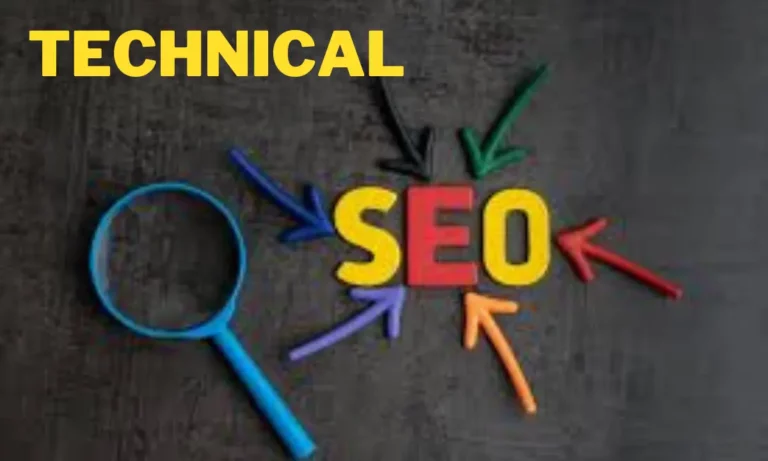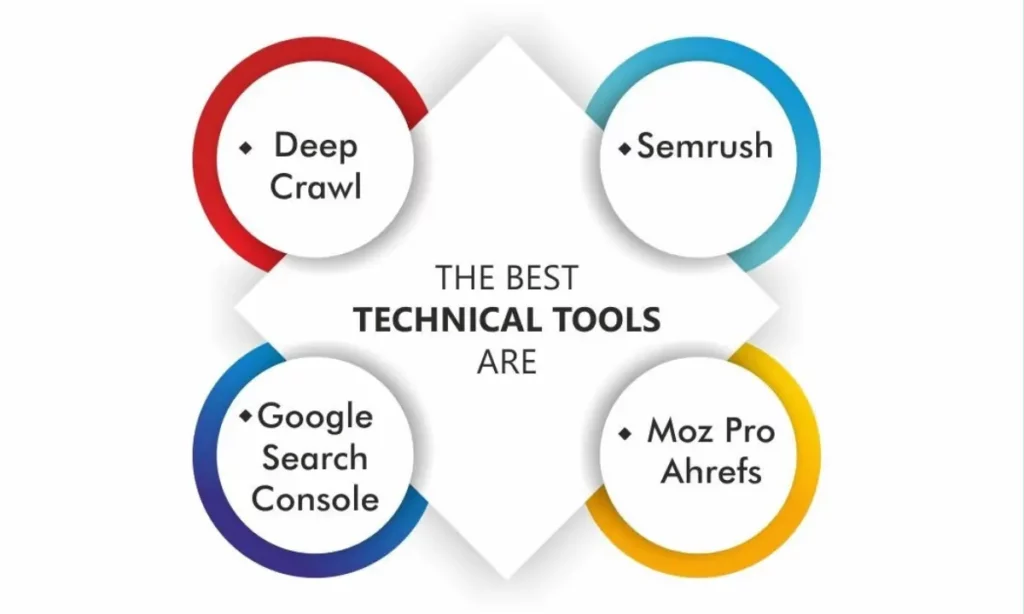Understanding Technical SEO: A Comprehensive Guide: Businesses of all sizes must establish an online presence in today’s digital era. But merely having a website is not enough; you must optimize it to rank high on search engine results pages (SERPs). This is where Technical SEO comes into play. In this article, I will delve into the world of Technical SEO, exploring its intricacies and providing valuable insights to help you enhance your website’s performance and visibility.
Understanding Technical SEO
What Is Technical SEO?
Understanding technical SEO, your website’s technical aspects are optimized to improve its search engine visibility. It focuses on enhancing the website’s infrastructure, speed, and overall performance to make it more appealing to search engine algorithms.
The Importance of Technical SEO
Understanding Technical SEO plays a vital role in determining how search engines rank your website. A well-optimized site ensures that search engine crawlers can easily index its content, resulting in higher rankings and increased organic traffic.

How Technical SEO Differs from On-Page SEO
While on-page SEO deals with optimizing content and individual web pages, technical SEO is concerned with the website’s backend. It ensures that your site is technically sound and user-friendly, which indirectly affects its search engine ranking.
The Fundamentals of Understanding Technical SEO

1- Website Speed and Performance
The speed of a website is one of the most important SEO factors. Slow-loading websites frustrate users and lead to high bounce rates, negatively impacting rankings. Compress images, leverage browser caching, and use Content Delivery Networks (CDNs) to boost your site’s speed.
2- Mobile-Friendliness
It is increasingly important to have a mobile-friendly website due to the growing use of mobile devices. Ensure responsive design, optimize images for mobile, and provide a seamless user experience across all devices.
3- Indexing and Crawling
Search engines rely on crawling and indexing to rank websites. Ensure that your site’s robots.txt file allows search engine bots to crawl important pages while blocking irrelevant ones. Submit an XML sitemap to aid in indexing.

Leveraging Structured Data
Structured data provides search engines with context about your content. Implementing structured data can result in rich snippets in search results, improving click-through rates.
Benefits of Schema Markup
Schema markup helps search engines understand the content’s intent, enabling them to display it more effectively. It’s particularly beneficial for local businesses, events, and products.
Implementing Schema Markup
Adding schema markup to your website requires technical expertise. Use schema markup generators or consult developers to ensure correct implementation.

The Role of XML Sitemaps
Your sitemap serves as a guide for search engine crawlers, directing them to essential pages. Regularly update and submit your sitemap to search engines.
How to Create an XML Sitemap
Various tools and plugins can help you generate XML sitemaps automatically, ensuring that they stay up to date as your website evolves.
Robots.txt: Your Website’s Gatekeeper
Robots.txt file instructs search engines on which parts of your site to crawl and which to ignore. Properly configure it to prevent indexing of sensitive or duplicate content.
Designing a User-Friendly Website Architecture
A well-organized site structure improves user experience and helps search engines understand your content hierarchy.
Crafting SEO-Friendly URLs
Optimize URLs by including relevant keywords and avoiding excessive parameters or numbers. Clean, descriptive URLs are favored by search engines.
The Impact of URL Structure on SEO
A logical URL structure aids in ranking higher on SERPs. Search engines index your content better and users are able to navigate more easily.
SSL and Website Security
The Significance of SSL Certificates
SSL certificates encrypt data transmitted between users and your website, ensuring security. Google gives preference to secure sites in search rankings.
Securing Your Website
Make sure your website has an SSL certificate installed. Regularly update security protocols to protect against vulnerabilities.
SEO Implications of Website Security
Secure websites instill trust in users and search engines alike. Security breaches can lead to a drop in rankings and a loss of credibility.
On-Page Technical Elements
Optimizing Title Tags and Meta Descriptions
Make sure your title tags and meta descriptions accurately reflect the content you are writing. These elements influence click-through rates from search results.
Header Tags (H1, H2, H3, H4)
Use header tags to structure your content hierarchically. H1 tags should indicate the main topic, while H2-H4 tags organize subtopics.
Image Optimization for SEO
Optimize images by compressing them, using descriptive file names, and adding alt text. This improves page load times and accessibility.
Technical SEO Tools and Resources
Google Search Console
Google Search Console provides insights into your website’s performance in Google search. Monitor indexing, fix issues, and submit sitemaps.
Screaming Frog SEO Spider
Screaming Frog is a powerful tool that crawls websites, providing data on technical issues, broken links, and more.
SEMrush
A comprehensive suite of SEO tools is available from SEMrush, including keyword research, competitor analysis, and site auditing.

Moz Pro
Moz Pro provides valuable SEO insights, including site audits, keyword tracking, and backlink analysis.
The Role of Backlinks in Technical SEO
Building High-Quality Backlinks
Quality backlinks from authoritative sources boost your website’s credibility and SEO ranking. Focus on earning natural backlinks through valuable content.
Link Audit and Disavow
Regularly audit your backlink profile and disavow low-quality or spammy links to maintain a clean link profile.
The Impact of Backlinks on SEO
Backlinks remain a fundamental aspect of SEO. Search engines recognize them as signals of trust and authority.
Content Duplication and Canonicalization

Dealing with Duplicate Content
Duplicate content can harm SEO. Identify and address duplicate pages, ensuring that search engines index the correct version.
Canonical Tags: A Solution
Canonical tags help specify the preferred version of a page when duplicates exist, preventing SEO issues.
International SEO Considerations
Expanding Globally
International SEO strategies enable your website to reach global audiences. Plan for language and region-specific content.
Hreflang Tags for Multilingual Websites
Hreflang tags signal to search engines which language and regional versions of your content to display to users in different locations.
Geotargeting in Google Search Console
Use Google Search Console’s geotargeting feature to specify the geographical target audience for your website.
E-commerce and Technical SEO
SEO for Online Stores
E-commerce websites face unique SEO challenges. Optimize product listings, implement user reviews, and improve site speed.
Product Page Optimization
Enhance product pages with detailed descriptions, high-quality images, and customer reviews to boost conversions.
Handling Reviews and Ratings
Manage customer reviews and ratings to build trust and credibility, positively impacting SEO.
Algorithm Updates and SEO Adaptation
Staying Informed
By following SEO news and blogs, you can stay on top of algorithm changes and industry trends.
Adapting to Algorithm Changes
Adapt your SEO strategy to align with algorithm updates. Focus on providing valuable content and a great user experience.
Google’s Core Updates
Google’s core updates can significantly impact rankings. Monitor your site’s performance and make necessary adjustments.
FAQs
1. What is the primary goal of Technical SEO?
Understanding Technical SEO aims to optimize a website’s technical aspects, including speed, performance, and infrastructure, to improve its visibility on search engines.
2. Why is mobile-friendliness crucial in Technical SEO?
Mobile-friendliness is vital because an increasing number of users access websites on mobile devices. A mobile-friendly site ensures a seamless user experience and better search engine rankings.
3. How can I check my website’s page loading speed?
By Understanding Technical SEO using tools like Google PageSpeed Insights or GTmetrix, you can check your website’s loading speed and receive recommendations.
4. What is the significance of structured data and schema markup?
Structured data and schema markup provide context to search engines, leading to rich snippets in search results and improved click-through rates.
5. How often should I monitor my website’s SEO performance?
Regular monitoring is essential. At a minimum, check your website’s SEO performance monthly to address any issues promptly and adapt to algorithm changes
Conclusion
In the ever-evolving landscape of online search, Technical SEO remains a fundamental pillar of success. By mastering the technical aspects of your website, you can enhance its visibility, attract more organic traffic, and ultimately achieve your online goals. Remember, the journey of Technical SEO is ongoing, so take action now to optimize your website and stay ahead in the digital game.
